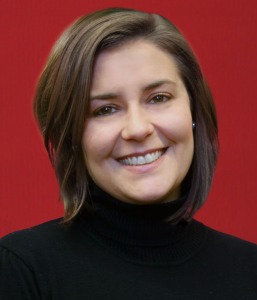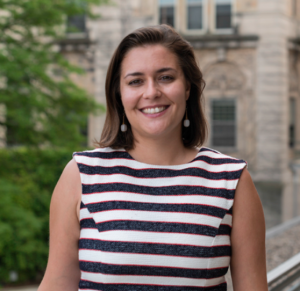UW–Madison’s Global Higher Education (GHE) Master’s Degree Program is celebrating its 10th anniversary during the current academic year.
The program, housed in the School of Education’s highly ranked Department of Educational Leadership and Policy Analysis, focuses on training future generations of professionals and scholars and is known for its family-like, collaborative learning community that utilizes a cohort model. Students follow the course sequence together, which provides a daily platform for exchanging ideas, sharing experiences, and sharing expertise regarding current and critical issues in international higher education.
As they move through the program together, students have opportunities to expand their professional networks, build lifelong friendships, and provide support to each other among cohort fellows. Students who have completed the program describe the cohort experience as one of the most valuable aspects of the GHE program, which features a good mix of students who grew up in the United States learning alongside students who are coming to Madison from abroad.
GHE also centers its efforts on connecting education with career development, including embedded internships, and on individualized mentoring and career coaching from Weijia Li, the GHE program director.
To further help people understand the Global Higher Education Master’s Degree Program, the School of Education’s communications team caught up with some alumni of the program.
Following is one such Q&A conducted with Samantha McCabe, who graduated from the program in 2017. Today, McCabe is the director of UW–Madison’s Office of International Student Services (ISS), where she leads the charge of ISS to advocate and support international students studying at UW–Madison. In this role, McCabe works closely with campus administration and Big Ten university colleagues to create policies and practices that support international students in the most inclusive and engaging way.

McCabe has been the permanent director of ISS since May of 2021, but previously served as interim director since October 2019. Before taking on that leadership role with ISS, McCabe was the assistant director for compliance in that same office, and she served as an international student adviser while she was completing the GHE program.
How did you end up in the GHE Master’s Degree Program? I came to UW–Madison in the fall of 2013 to take a position as an international student adviser. I came with a couple of years of experience working directly with international students. In my role when I started I helped coordinate an international speakers program, and a student worker who was helping out was a graduate student in global higher ed. Through supervising her and learning more about her journey, and her experience in that master’s program, she was like, “You really should apply.” I wanted to get a master’s but I still wasn’t certain if this was the field that I wanted to be in. So I learned more about the program and found it would be a good fit.
Weijia Li often talks about the family atmosphere of this program and how people really connect with other members of the cohort. What was that experience like for you? My cohort was quite small. There were just seven of us and only one international student, so we were a very, very close cohort. In fact, four of us still live here in Madison, and we still get together for taco Tuesdays once a month. There are three who have moved away and all are now living abroad. We all still keep in touch with them. We still try to do an annual, virtual get together. We chat and share resources together.
The family atmosphere quite honestly is one of the things that, especially as a full-time employee and a full-time graduate student, got me through the program. I could rely on my cohort mates to support me inside and outside of the classroom.
 What aspects of the program did you enjoy the most or get the most out of? I think every year my answer has changed. At first, it was the cohort — going through the progression of courses like educational research and research methodology was very new and daunting. But going through that with my cohort mates was such a valuable experience, because we could share not only our educational experiences, but also our practical experiences where I’ve used this in real life.
What aspects of the program did you enjoy the most or get the most out of? I think every year my answer has changed. At first, it was the cohort — going through the progression of courses like educational research and research methodology was very new and daunting. But going through that with my cohort mates was such a valuable experience, because we could share not only our educational experiences, but also our practical experiences where I’ve used this in real life.
I’m also very happy that I entered global higher ed instead of just ELPA, or higher administration, because the level of support and the types of things I learned was outstanding.
I think another layer to all this is Weijia himself. He is one of the most supportive mentors and advisers I have ever had in my entire life, educational journey, and professional career. He just takes such a personalized approach in the program. It’s amazing how many of us start by saying, “I want to study abroad. I want to travel. I want to send students abroad.” That’s how I got into the field. His individualized support helped us focus on what comes next. “Do you want to pursue a PhD? Do you want to enter into the field?” The more I look back at it and the classes that I had to take, I use that information every single day. If I didn’t have that base knowledge of information, I would not be as effective as a director in my current role. I pull upon that coursework daily in my work.
So it sounds like the program prepared you for what you want to do next? Absolutely. I don’t think that I would have been a strong enough candidate for the assistant director for compliance role that I held at ISS without it. And I wouldn’t have been ready to become a director. My ultimate goal at that time was to move back to a smaller school and be a director, not stay at a research institution like UW–Madison. I’m very glad that my trajectory has led me here, but that was not my intention at the time. I think finishing the program, going through the coursework, and making the connections I did with the faculty and my peers gave me the confidence to excel in this role.
What do you do in your role today as a director? Mostly a lot of change management with personnel, with the organization, and with our service delivery. Giving a lot of intentional thought to how we deliver our services to students. As our international student enrollment has increased over the years, we want to be intentional with our inclusive design of a new physical office space to include spaces such as an interfaith prayer room and community gathering space for international students, faculty, and staff.